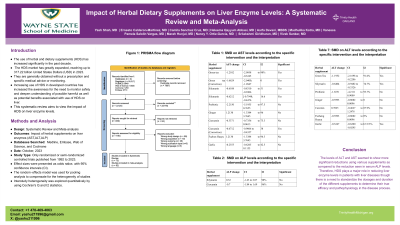Monday Poster Session
Category: Liver
P2948 - Impact of Herbal Dietary Supplements on Liver Enzyme Levels: A Systematic Review and Meta-Analysis
Monday, October 28, 2024
10:30 AM - 4:00 PM ET
Location: Exhibit Hall E


Yash R. Shah, MD
Trinity Health Oakland / Wayne State University School of Medicine
Pontiac, MI
Presenting Author(s)
Yash R. Shah, MD1, Ernesto Calderon-Martinez, MD2, Camila Sanchez Cruz, MD3, Heleema Qayyum Abbasi, MD4, Aarfa Devani, MBBS5, Madhulika Kotra, MD6, Vanessa Pamela Salolin Vargas, MD7, Marah Hunjul, MD8, Nancy Y. Ortiz-Garcia, MD9, Srilakshmi Giridharan, MD8, Vivek Sanker, MD10
1Trinity Health Oakland / Wayne State University School of Medicine, Pontiac, MI; 2University of Texas at Houston, Houston, TX; 3Nacional Autonoma de Mexico, Mexico City, Estado de México, Mexico; 4Ayub Medical College, Abottabad, Northern Areas, Pakistan; 5M.S. Ramaiah Medical College, Banglore, Karnataka, India; 6An-Najah National University, Nablus, Palestinian Territories; 7Universidad Westhill, Ciudad de Mexico, Estado de México, Mexico; 8Stanley Medical College, Chennai, Tamil Nadu, India; 9Universidad Juarez del Estado de Durango, Durango, Durango, Mexico; 10Society of Brain Mapping and Therapeutics, Pacific Palisades, CA
Introduction: The use of herbal and dietary supplements (HDS) has increased significantly in the past decade. Increasing use of HDS in developed countries has increased the awareness for the need to monitor safety and deepen understanding of possible harmful as well as potential benefits associated with use of HDS on liver as it plays a major role in metabolism of HDS. Certain HDS are believed to have potential benefits in treating liver disease. Liver enzymes reflect the integrity of hepatocytes. This study aims to view the impact of HDS on liver enzyme levels.
Methods: Following PRISMA 2020 guidelines, we systematically reviewed studies in Medline, Embase, Web of Science, and Cochrane databases. Our inclusion criteria comprised randomized clinical trials (RCT) published between 1992 and 2023, accessible in English, adult populations (age 18-65 years), irrespective of gender, who used or had used herbal and/or dietary supplements in any form of consumption with a primary focus on reporting liver enzyme levels in patients with only prior hepatic disease.
Results: Of the 22,420 articles initially screened articles, 73 RCTs met the inclusion criteria and were included in the qualitative review. Due to lack of data for pooling analysis, only 62 articles were included in the main analysis. The pool of studies employed several different interventions, such as silymarin, curcumin, green tea, probiotics and others including Korean red ginseng, ginger, garlic, and fuzheng huayu. Furthermore, all the supplements, except for ginger and Fuzhenghuayu have been shown to decrease the liver enzyme levels. Based on the result of initial analysis, aspartate transaminase (AST) levels revealed a significant reduction of -0.5584 SMD (95% CI: -1.083 to -0.04), alanine transaminase (ALT) enzymes revealed a significant reduction of -0.7328 SMD (95%-CI: -1.2978 to -0.1678), and alkaline phosphatase (ALP) enzymes analysis revealed a reduction of -1.3258 SMD (95%-CI: -3.3005 to 0.6488).
Discussion: The levels of ALT and AST seemed to show more significant reductions using various supplements as compared to the reduction seen in serum ALP levels. Therefore, HDS plays a major role in reducing liver enzyme levels in patients with liver diseases though there is a need to standardize the dosages and duration of the different supplements to determine their true efficacy and pathophysiology in the disease process.
Disclosures:
Yash R. Shah, MD1, Ernesto Calderon-Martinez, MD2, Camila Sanchez Cruz, MD3, Heleema Qayyum Abbasi, MD4, Aarfa Devani, MBBS5, Madhulika Kotra, MD6, Vanessa Pamela Salolin Vargas, MD7, Marah Hunjul, MD8, Nancy Y. Ortiz-Garcia, MD9, Srilakshmi Giridharan, MD8, Vivek Sanker, MD10. P2948 - Impact of Herbal Dietary Supplements on Liver Enzyme Levels: A Systematic Review and Meta-Analysis, ACG 2024 Annual Scientific Meeting Abstracts. Philadelphia, PA: American College of Gastroenterology.
1Trinity Health Oakland / Wayne State University School of Medicine, Pontiac, MI; 2University of Texas at Houston, Houston, TX; 3Nacional Autonoma de Mexico, Mexico City, Estado de México, Mexico; 4Ayub Medical College, Abottabad, Northern Areas, Pakistan; 5M.S. Ramaiah Medical College, Banglore, Karnataka, India; 6An-Najah National University, Nablus, Palestinian Territories; 7Universidad Westhill, Ciudad de Mexico, Estado de México, Mexico; 8Stanley Medical College, Chennai, Tamil Nadu, India; 9Universidad Juarez del Estado de Durango, Durango, Durango, Mexico; 10Society of Brain Mapping and Therapeutics, Pacific Palisades, CA
Introduction: The use of herbal and dietary supplements (HDS) has increased significantly in the past decade. Increasing use of HDS in developed countries has increased the awareness for the need to monitor safety and deepen understanding of possible harmful as well as potential benefits associated with use of HDS on liver as it plays a major role in metabolism of HDS. Certain HDS are believed to have potential benefits in treating liver disease. Liver enzymes reflect the integrity of hepatocytes. This study aims to view the impact of HDS on liver enzyme levels.
Methods: Following PRISMA 2020 guidelines, we systematically reviewed studies in Medline, Embase, Web of Science, and Cochrane databases. Our inclusion criteria comprised randomized clinical trials (RCT) published between 1992 and 2023, accessible in English, adult populations (age 18-65 years), irrespective of gender, who used or had used herbal and/or dietary supplements in any form of consumption with a primary focus on reporting liver enzyme levels in patients with only prior hepatic disease.
Results: Of the 22,420 articles initially screened articles, 73 RCTs met the inclusion criteria and were included in the qualitative review. Due to lack of data for pooling analysis, only 62 articles were included in the main analysis. The pool of studies employed several different interventions, such as silymarin, curcumin, green tea, probiotics and others including Korean red ginseng, ginger, garlic, and fuzheng huayu. Furthermore, all the supplements, except for ginger and Fuzhenghuayu have been shown to decrease the liver enzyme levels. Based on the result of initial analysis, aspartate transaminase (AST) levels revealed a significant reduction of -0.5584 SMD (95% CI: -1.083 to -0.04), alanine transaminase (ALT) enzymes revealed a significant reduction of -0.7328 SMD (95%-CI: -1.2978 to -0.1678), and alkaline phosphatase (ALP) enzymes analysis revealed a reduction of -1.3258 SMD (95%-CI: -3.3005 to 0.6488).
Discussion: The levels of ALT and AST seemed to show more significant reductions using various supplements as compared to the reduction seen in serum ALP levels. Therefore, HDS plays a major role in reducing liver enzyme levels in patients with liver diseases though there is a need to standardize the dosages and duration of the different supplements to determine their true efficacy and pathophysiology in the disease process.
Disclosures:
Yash Shah indicated no relevant financial relationships.
Ernesto Calderon-Martinez indicated no relevant financial relationships.
Camila Sanchez Cruz indicated no relevant financial relationships.
Heleema Qayyum Abbasi indicated no relevant financial relationships.
Aarfa Devani indicated no relevant financial relationships.
Madhulika Kotra indicated no relevant financial relationships.
Vanessa Pamela Salolin Vargas indicated no relevant financial relationships.
Marah Hunjul indicated no relevant financial relationships.
Nancy Y. Ortiz-Garcia indicated no relevant financial relationships.
Srilakshmi Giridharan indicated no relevant financial relationships.
Vivek Sanker indicated no relevant financial relationships.
Yash R. Shah, MD1, Ernesto Calderon-Martinez, MD2, Camila Sanchez Cruz, MD3, Heleema Qayyum Abbasi, MD4, Aarfa Devani, MBBS5, Madhulika Kotra, MD6, Vanessa Pamela Salolin Vargas, MD7, Marah Hunjul, MD8, Nancy Y. Ortiz-Garcia, MD9, Srilakshmi Giridharan, MD8, Vivek Sanker, MD10. P2948 - Impact of Herbal Dietary Supplements on Liver Enzyme Levels: A Systematic Review and Meta-Analysis, ACG 2024 Annual Scientific Meeting Abstracts. Philadelphia, PA: American College of Gastroenterology.
